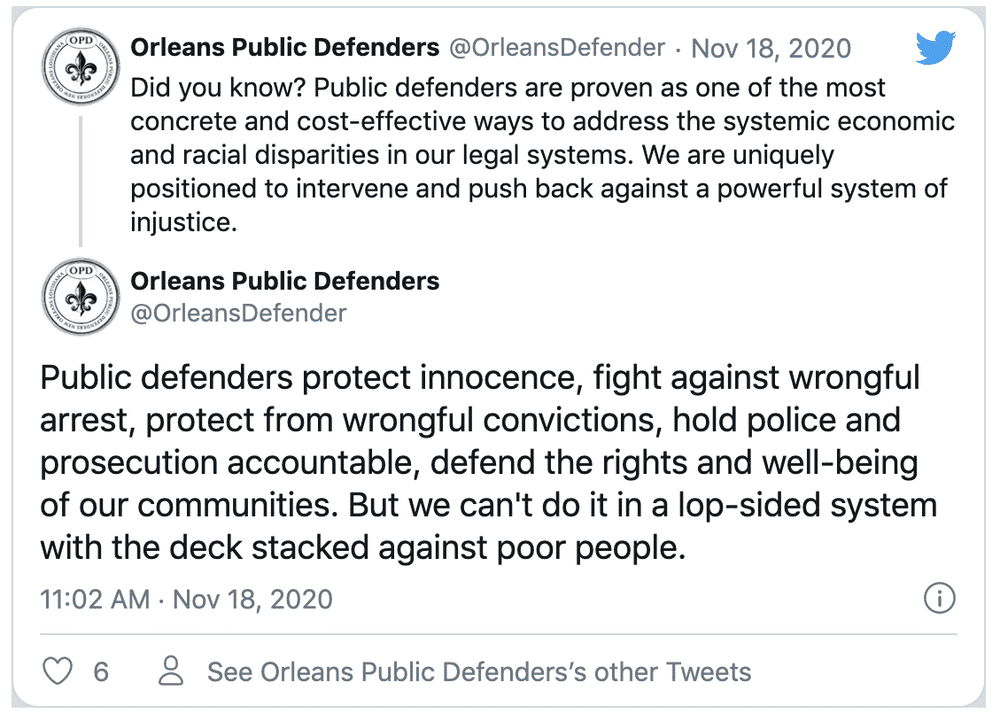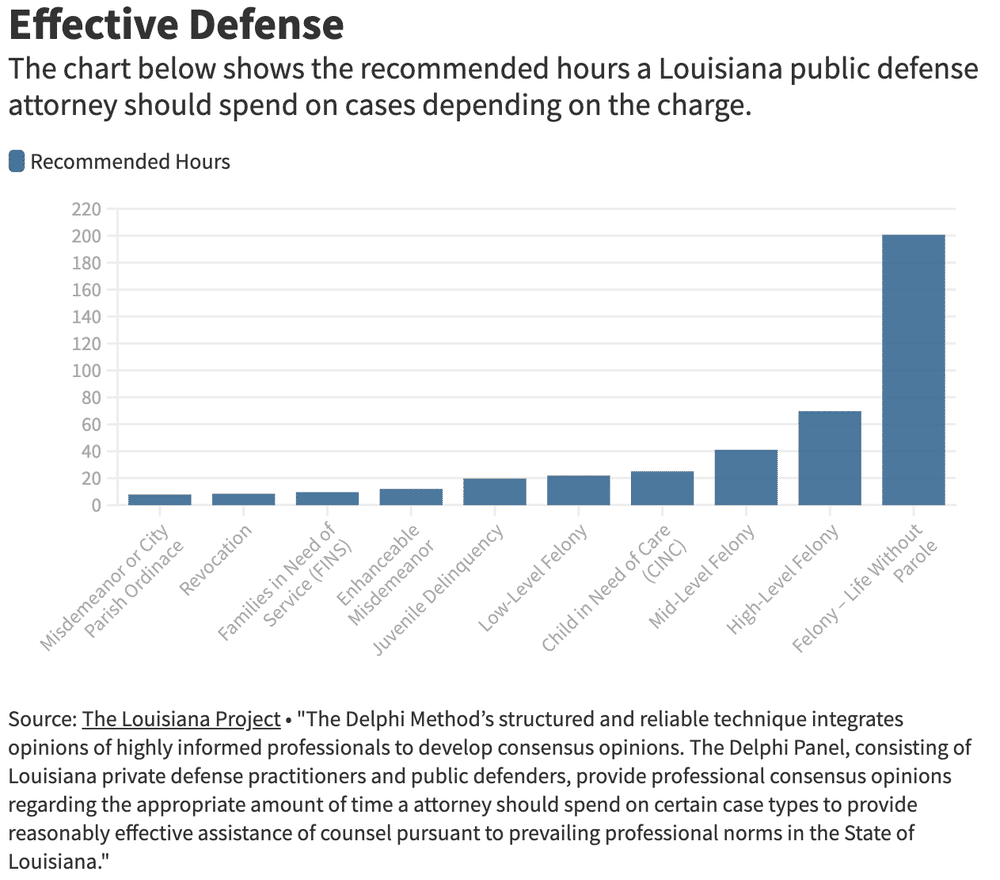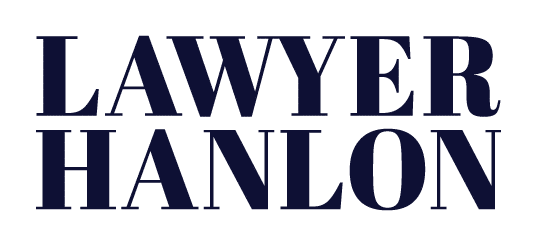Want Us To Contact You?
As a man who’s dedicated his 15-year career to helping those charged with crimes but can’t afford a private defense attorney, Danny Engelberg understands the work of a public defender all too well.
He likens the work to riding a fast-moving rollercoaster. Most mornings are a steady climb to the top as attorneys get acquainted with new clients and assess their cases. Then comes the high-speed drop of prioritizing cases, doing the limited investigating time allows, and fighting as best they can for those who lack the financial resources to navigate the complex legal system.
In reality, it’s more like a slow-motion disaster. And it needs to be fixed before more people end up being hurt.
At the Orleans Public Defenders office, where Engelberg serves as trial chief, people find themselves represented by attorneys who are carrying burdensome caseloads in an office that lacks the funding necessary to provide an adequate defense for everyone it represents.
Engelberg’s office offers a glimpse into public defense offices nationwide and a system that has the odds stacked against it in its fight against better-resourced district attorney’s offices and police departments.
It’s a system, Engelberg said, that produces mass incarceration and disproportionately affects communities of color.
‘CRIMINAL PROCESSING SYSTEM’
In 2018, the Orleans Public Defenders represented people in nearly 25,000 cases filed in New Orleans, Louisiana. Those cases ranged from murders that carried life-without-parole sentences to misdemeanor drug offenses that, though less severe, can add a lasting mark to a person’s criminal history.
That immense caseload means attorneys with the office can carry more than 200 cases at a time, an onerous task that can lead to prioritizing cases by their importance. Those necessary decisions can have grave consequences for people who can’t afford cash bail and sit in jail for months, even for low-level crimes. That pretrial detention often means a loss of jobs, housing, any social services they received, and can lead people to take a plea deal whether they’re guilty of the crime or not simply to get out of jail sooner.

In a blog post written in July, OPD staff attorney Diana Yu wrote about the shortfalls she faced—many of which were made worse by the novel coronavirus pandemic.
“For all of us who feel like we are losing months of our lives in limbo, some of my clients are spending those months stuck in a dystopian trap,” she wrote. “They’re presumed innocent. They were promised they would get their day in court. But when that day will come, nobody knows.”
The pandemic has forced furloughs on all staff as the office faces an $800,000 shortfall in funding. Chief Defender Derwyn Bunton said OPD is the “only entity within the criminal legal system in this situation. This will have serious ramifications.”
Yu wrote about those ramifications in her post.
“With investigators being furloughed—like all of us at OPD—critical investigation on cases becomes even scarcer. Even before COVID, my clients often faced impossible choices like having to decide whether to take a plea offer while having very little information about their case or sit in jail even longer, waiting.”
She added, “Our clients deserve better.”
Stephen Hanlon has spent decades in the public defense space, both as a partner at a national law firm and as an advocate conducting nationwide studies to drive change.
Over the years, one thing has been made very clear to him about how the system works. “It is not a criminal justice system,” he said. “It’s a criminal processing system.”
“The lawyers are so dramatically overwhelmed—and these are all fine people—but there’s no way that they can perform ethically and constitutionally,” Hanlon said. “And it’s horrifying when you see it.”
In a study conducted in Louisiana, Hanlon found that public defenders were carrying workloads five times the amount recommended to provide sufficient defense for their clients. The study also found that Louisiana public defenders had roughly 21 percent of the resources necessary to do their jobs properly. (This study, done in partnership with the National Association of Public Defenders and American Bar Association, was funded by Arnold Ventures as part of the National Partnership for Pretrial Justice.)
Other studies in Missouri and Rhode Island made similar findings that public defenders there were carrying workloads two or three times higher than they should. Hanlon is currently conducting more studies in New Mexico and Oregon.
Hanlon compared those workloads to that of a doctor.
“If an obstetrician had five times as much work as they could handle competently, terrible things would happen,” he said. “If a public defender has five times as much work as they could handle competently, terrible things would happen.”
The workload is reaching a breaking point at OPD. Engelberg said if the caseload continues at its current pace, attorneys are likely going to have to begin refusing new cases because they ethically won’t be able to take on more work.
It wouldn’t be the first time for the office. In 2017, attorneys started refusing new felony cases. When asked during a CBS News interview at the time if having a public defender was better than no attorney, Chief Public Defender Bunton put it bluntly: “A lawyer poorly resourced can cause irreparable harm to a client.”
DATA-DRIVEN REFORM
Hanlon believes he has an answer that will benefit the entire system: data and analytics.
In each of the statewide studies, Hanlon is collecting hard, reliable data that can be used to “end the grossly excessive caseload of public defenders.”
As part of his studies, he gathers public defenders and private defense lawyers to help craft new recommended guidelines on how much time attorneys should spend to provide a reasonable defense for various crimes.
In the Louisiana study, the attorneys agreed eight hours should go into defending a misdemeanor case. For a felony case in which life without parole is a possibility, the consensus was 201 hours should be dedicated to the case.

He hopes his research, which includes various stakeholders and has been validated using the Delphi Method, will replace the outdated 1973 National Advisory Commission’s guidelines that state attorneys shouldn’t work more than 150 felony cases or 400 non-traffic-related misdemeanors per year.
Hanlon has found success in Missouri, where a judge ruled that if a public defender can prove they have too many cases then they can’t be ordered to take on more cases because it’s both unethical and unconstitutional.
The data he’s collecting, he hopes, will lead to better funding for public defense offices nationwide by showing the system’s stakeholders the hours needed to effectively defend cases. Armed with that data, offices nationwide would be better equipped to advocate for more resources that are on par with district attorney offices.
Hanlon, however, notes that it’s not just a matter of legal resources.
He believes the system should stop criminalizing issues like homelessness, addiction, and mental illness. Doing so, he said, will help ease the burden on both sides by lessening caseloads and, in turn, freeing up time to focus on cases that affect public safety.
Of course, not everyone is on board with his work. Hanlon has been accused of trying to destroy criminal courts as we know them.
Then again, Hanlon doesn’t deny the charges.
“I’m trying to blow up the entire criminal processing system,” he said. “And turn it into a criminal justice system.”
And he believes he’s close to achieving his goal.
He’s conducting a meta study that will provide “a critical mass of reliable data and analytics that will produce reliable, 21st century national numerical caseload and workload standards for public defenders.” Once complete, he plans to present that data to Congress as a tool when evaluating a bill to fund the public defense system nationwide.
The EQUAL Defense Act of 2019, introduced by California Sen. Kamala Harris (now vice president-elect Harris), would create a $250 million grant program aimed at funding public defense across the nation. The money would go to supporting workload limits, pay parity between public defenders and prosecutors, and providing yearly data on workloads.
Harris said the bill will “give public defenders the tools they need to ensure a more effective criminal justice system.”
Those resources would help offices like Orleans Public Defenders, which has about half the budget of the district attorney’s office.
In 2018, the city of New Orleans allocated more than $6 million to the district attorney and $1.5 million to OPD.
As Engelberg and OPD staff continue the daily rollercoaster ride, he has another message that would free up resources and ease their burden.
“As a public defender for over 15 years,” he said, “I can say that over half of what I see has nothing to do with public safety.”
This article first appeared at www.pretrialpartnership.org. Main image courtesy of theintercept.com.
